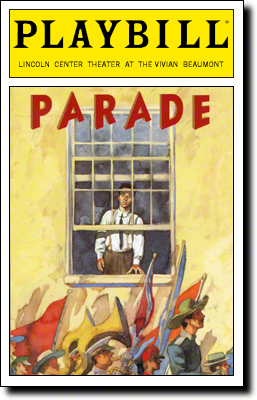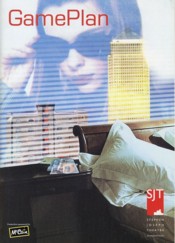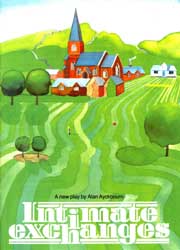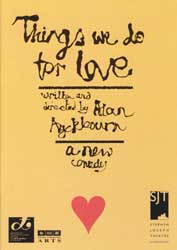
Sir Alan Ayckbourn is a prolific British playwright and director. He has written and produced as of 2023, 89 full-length plays in Scarborough and London and was, between 1972 and 2009, the artistic director of the Stephen Joseph Theatre in Scarborough, where all but four of his plays have received their first performance. More than 40 have subsequently been produced in the West End, at the Royal National Theatre or by the Royal Shakespeare Company since his first hit Relatively Speaking opened at the Duke of York's Theatre in 1967.

The Pumpkin Eater is a 1964 British drama film starring Anne Bancroft as an unusually fertile woman and Peter Finch as her philandering husband. The film was adapted by Harold Pinter from the 1962 novel of the same title by Penelope Mortimer and was directed by Jack Clayton. The title is a reference to the nursery rhyme "Peter Peter Pumpkin Eater".

A Lie of the Mind is a play written by Sam Shepard, first staged at the off-Broadway Promenade Theater on 5 December 1985. The play was directed by Shepard himself with stars Harvey Keitel as Jake, Amanda Plummer as Beth, Aidan Quinn as Frankie, Geraldine Page as Lorraine, and Will Patton as Mike. The music was composed and played by the North Carolina bluegrass group the Red Clay Ramblers.

Parade is a musical with a book by Alfred Uhry and music and lyrics by Jason Robert Brown. The musical is a dramatization of the 1913 trial and imprisonment, and 1915 lynching, of Jewish American Leo Frank in Georgia.

Woman in Mind (December Bee) is the 32nd play by English playwright Alan Ayckbourn. It was premiered at the Stephen Joseph Theatre In The Round, Scarborough, in 1985. Despite pedestrian reviews by many critics, strong audience reaction resulted in a transfer to London's West End. The play received its London opening at the Vaudeville Theatre in 1986 where it received predominantly excellent reviews.

Malcolm Sinclair is a British stage and television actor and former President of Trade Union, Equity 2010–18 when he stood down after 4 terms and was replaced by Maureen Beattie. He played Assistant Chief Constable Freddy Fisher in the television series Pie in the Sky from 1994 to 1997.

Taking Steps is a 1979 farce by British playwright Alan Ayckbourn. It is set on three floors of an old and reputedly haunted house, with the stage arranged so that the stairs are flat and all three floors are on a single level.

GamePlan is a 2001 play by British playwright Alan Ayckbourn, the first in a trilogy of plays called Damsels in Distress The darkest of the three plays, it is about a teenage girl who tries to support herself and her mother through prostitution.

Damsels in Distress is a trilogy of plays written in 2001 by British playwright Alan Ayckbourn. The three plays, GamePlan, FlatSpin and RolePlay, were originally performed as a set by the Stephen Joseph Theatre Company (SJT). The plays were written to be performed by the same seven actors using the same set. Although the plays loosely shared some common themes, the three stories were independent of each other and unconnected.
Humble Boy is a 2001 English play by Charlotte Jones. The play was presented in association with Matthew Byam Shaw and Anna Mackmin, and was first performed on the Cottesloe stage of the Royal National Theatre on 9 August 2001.

If I Were You is a 2006 play by British playwright Alan Ayckbourn. It is about an unhappy married couple who are given the chance to understand each other by discovering, quite literally, what they would do "if I were you," in the same manner as the novel Turnabout by Thorne Smith.

Sugar Daddies is a 2003 play by British playwright Alan Ayckbourn. It is about a student who forms a friendship with a rich man over three times her age, who has a sinister past, and maybe a sinister present too.

Haunting Julia is a 1994 play by British playwright Alan Ayckbourn. It is about Julia Lukin, a nineteen-year-old brilliant musician who committed suicide twelve years earlier, who haunts the three men closest to her, through both the supernatural and in their memories. In 2008, it was presented as the first play of Things That Go Bump.

Snake in the Grass is a 2002 play by British playwright Alan Ayckbourn. The play is about a middle-aged older sister who returns to the family home where her younger sister still lives, shortly after their abusive father's death. It was written as a female companion piece to the 1994 ghost play Haunting Julia, and in 2008 these two plays, together with new play Life and Beth were folded into a trilogy named Things That Go Bump.
Things That Go Bump is a season of plays performed in 2008 by British playwright Alan Ayckbourn.

Intimate Exchanges is a play by Alan Ayckbourn. Written between 1982 and 1983 it consists of eight major stories all originating from a single opening scene. As the play progresses the characters make choices, each of which causes the story to go in one of two directions, leading to one of 16 possible endings. The play was nominated for the 1984 Laurence Olivier Award for Best New Comedy, and a 2006 revival was nominated for the 2008 Drama Desk Award for Outstanding Play on its transfer to the Brits Off Broadway festival in New York.

My Wonderful Day is a 2009 play by Alan Ayckbourn. It is about a nine-year-old girl, Winnie, who has an essay to write about her day, and records the shenanigans of grown-ups around her.

Things We Do For Love is a 1997 play by British playwright Alan Ayckbourn, premiered as the Stephen Joseph Theatre. It is about a woman who begins an affair with her best friend's fiancé, only for this new relationship to swiftly descend into violence. It was the first Ayckbourn play to be performed on the end-stage in the theatre's new end-space at its current site, and was performed with three floors in view: head-level of the basement, the whole of the ground floor and foot-level of the top floor.
How the Other Half Loves is a 1969 play in two acts by British playwright Alan Ayckbourn. It is a farce following the consequences of an adulterous affair between a married man and his boss's wife and their attempts to cover their tracks by roping in a third couple to be their alibi, resulting in a chain of misunderstandings, conflicts and revelations. The play is known to have secured Ayckbourn's runaway success as a playwright.

Katherine Jane "Katy" Harris is a fictional character from the British ITV soap opera Coronation Street, portrayed by Lucy-Jo Hudson. She made her first on-screen appearance on 13 November 2002, before departing in 2005. The teenage daughter of the Harris family, Katy's storylines centred on her family's victimisation by a gang, her diabetic diagnosis and her relationship with Martin Platt.

















